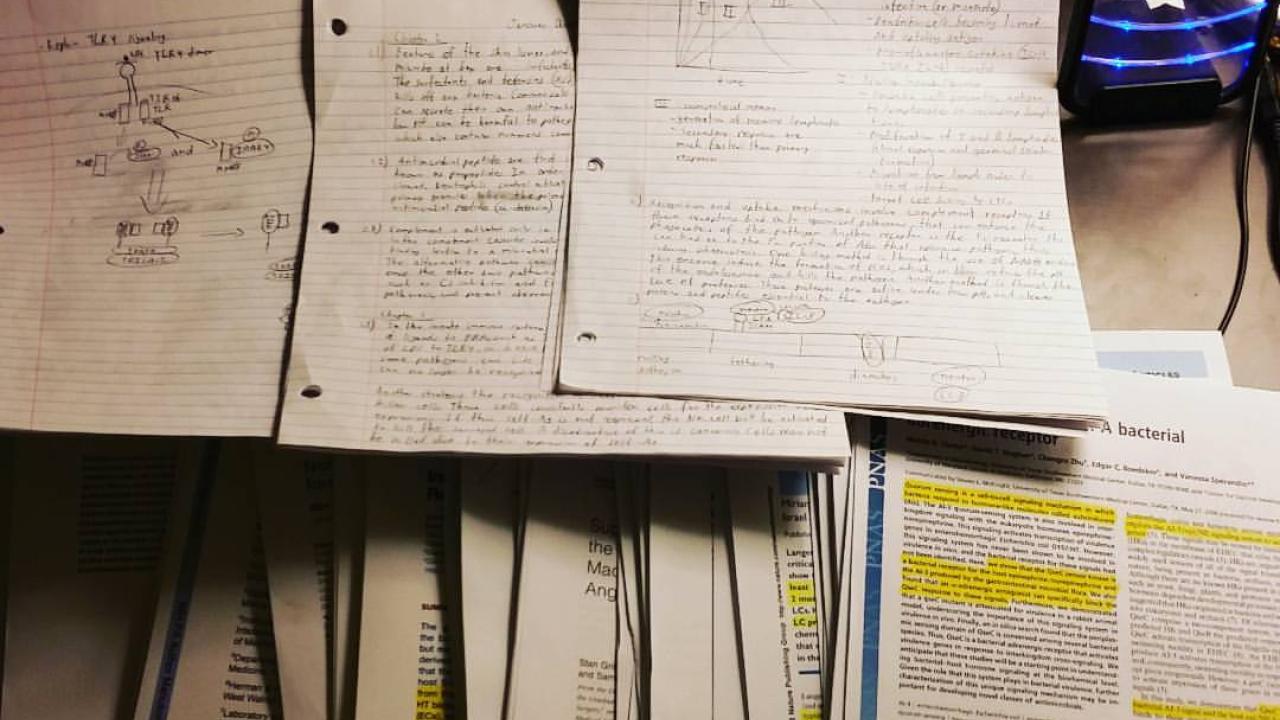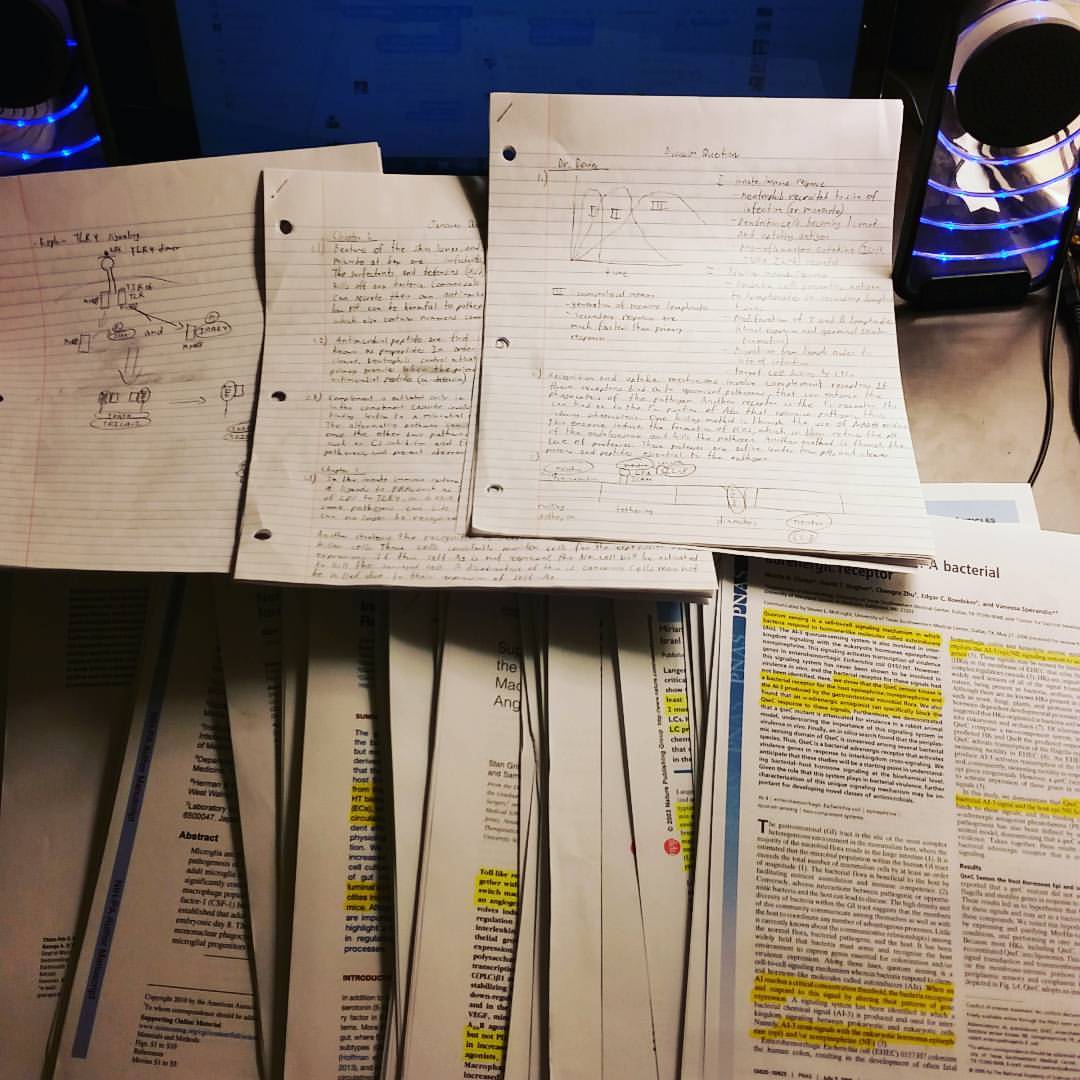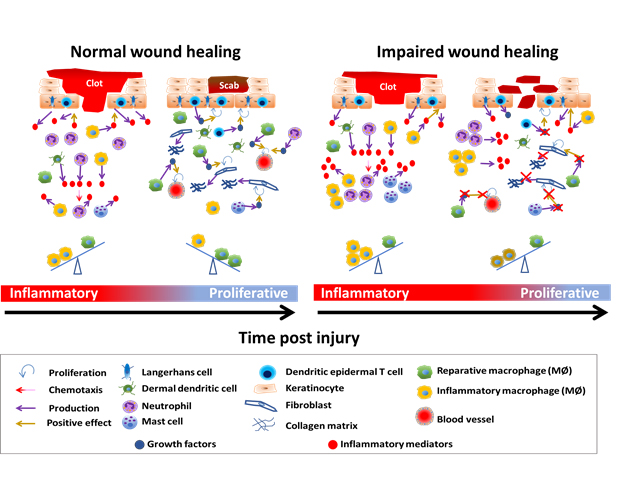
A Day in the Life of a PhD Student in the Biomedical Sciences
A Day in the Life of a PhD Student in the Biomedical Sciences
by Alan Nguyen
I am currently in my 6th year of graduate school and well on my way to finishing my dissertation/thesis. I am excited as the idea of graduating with my Ph.D. is becoming more of a reality with each passing week. I also recently met with my dissertation committee and they are all in agreement that I am ready to finish soon. Earning a doctorate degree is a big accomplishment and some of you may be thinking: “What does it take to make it through a Ph.D.?” “What are the things that I do to get my Ph.D., and how has the current COVID-19 pandemic affected my daily life at work?” Even though I have spent a decent amount of time in grad school, my family is rather clueless how grad school goes about for me, and I am certain that you, the reader, may be in the same boat. Here, I’ll give you my perspective at what life is like for someone who is studying for their Ph.D. in a biomedical science. Granted, this is only what I have experienced during my time in grad school and it isn’t completely representative of what other graduate students are experiencing during their studies. By the end of this blog, I hope you will gain some insight at what sort of obstacles and challenges we as graduate students encounter, and how we go about in taking on these challenges.
What does it take to complete a Ph.D.?
Being a terminal degree, it’s heavily implied that working toward a Ph.D. is not an easy task. I wholeheartedly agree with the above statement as I’ve found myself going through one of the most challenging moments of my life. Some of you may think that graduate school is another set of advanced classes where you take exams and end up attaining your degree after you complete a certain number of units. That would be correct if you were an undergraduate working toward their bachelor’s degree. One of the first things I learned about graduate school before I even began my program was that graduate school is not like going to college.
For the first couple years, you do take classes that are specific to your field of study. Those classes are executed in a similar manner to that of standard courses in which you take exams to pass the class. However, the similarities between college and grad school end there. Ph.D. students are expected to join a research lab under the mentorship of a faculty member where they will conduct their experiments for their thesis work. Shortly afterward, students are then expected to take and pass a “qualifying exam” which consists of a research proposal and Q&A related to their field. During the exam, a committee of professors is present and evaluates the student’s performance and ability to conduct and defend the research proposal. Just imagine being in a small room with three or more professors staring at you, inquiring for every detail of your proposal, and expecting you to know the answers to every question they ask. It can be an intimidating, if not, scary experience! Fortunately, most students are prepared for the qualifying exam and pass after their first attempt. After passing the exam, graduate students are now considered “Ph.D. candidates”.

Now that a Ph.D. candidate has passed their qualifying exam, the only thing left is getting the research work done and writing up that thesis before they can attain their doctorate degree – easy, right? Well, as the saying goes: “it’s easier said than done.” At this point, there really isn’t a defined path for a grad student to take to complete their degree. Students must select a number of professors to serve as the student’s dissertation/thesis committee. The purpose of this committee is to evaluate the student’s progress on their thesis work and to give guidance on their next steps. Essentially, the committee has the ability and power to determine when the graduate student can attain their doctorate degree. With that said, the time it takes to finish the doctorate degree can vary.
Even with the mentorship of a professor, conducting research is a very independent task. Grad students are expected to execute the scientific method on their own: create a hypothesis, test said hypothesis, analyze the collected data, and make conclusions based on the analyzed data. It is the research work that can present the biggest challenges to grad students. In a perfect world, all of our experiments would lead to results that would support our hypotheses, which would lead to having our findings being a part of a published manuscript in a respected research journal. Then, we would use these publications and manuscripts as part of our thesis which we can defend, and finally earn that doctorate degree. Again, this is easier said than done.
Often, our experiments will yield results that may not support our hypothesis or mean nothing (negative data). Obviously, having negative data is discouraging and presents several issues: Would we need to change our hypothesis or our approach to the experiments? Was the negative data due to a technical issue (i.e. bad reagents, human error, unavailability of equipment)? This can begin a vicious cycle in which the student attempts to troubleshoot and optimize their experiments, only to find that the results are the same, thus leading the student back to square one. In the worst-case scenario, a student may be forced to abandon their project and start fresh with a new one. This can be demoralizing for anyone who has spent a significant amount of time working on the project and can contribute to mental health issues and complications. In fact, it’s been reported that grad students are three times more likely to experience mental health disorders (ref).
To surmount these challenges, one must have an incredible amount of perseverance and be able to move forward with a “can-do” attitude. In grad school, it is a good quality to have a “tough skin” and not get caught up with every bad thing that is encountered. It’s also a good thing to keep an open mind when conducting research. As research scientists, grad students are delving into the unknown, and will never know what will happen during their experiments – they can only surmise and expect results based on previous studies and findings. So, it should be said that a grad student should maintain a healthy mindset and to not be taken aback when they run across something unexpected. Sometimes, the unexpected can yield a bright moment of serendipity which can lead down to insightful discoveries. Conquering fears of failure will help make working toward a Ph.D. more manageable. In addition, learning how to manage time and having a group of friends and/or family to have as a support group is a great way to manage stress (ref). Considering the difficulties that arise with grad school, it is absolutely a validating feeling and huge accomplishment when a student is told by their thesis committee that they can finally graduate.
My research and how the COVID-19 pandemic has altered my routine.
I am a Ph.D. student studying immunology (study of the immune system), and my research interests are focused on how the immune system reacts during the process of wound healing after a severe burn injury. It may not seem intuitive, but the immune system does play a large role in wound healing. To give you a brief overview of the immune system’s role, there are three phases of wound healing: inflammation, proliferation, and remodeling. Different types of immune cells are involved in each of the three phases and have different functions. For example, leukocytes (macrophages and neutrophils) infiltrate the injury to prevent any infections from forming in the injury site. Macrophages also help clear out any dead cells and release biomolecules that promote tissue repair. Without a proper immune response after an injury, wound healing is delayed which can lead to complications for the injured person. If you would like to read more on how the immune system is an integral part of the skin, you can check out this review that I’ve published.
Burn injuries are often slow to heal, which can be attributed to prolonged inflammation at the site of the burn wound. There are also other complications that can arise from a burn injury, such as infections, hypermetabolism leading to organ failure, and hypertrophic scarring. I won’t give too many details, but my work examines biological pathways that can regulate the local wound inflammation. Some of these pathways are well characterized in inflammatory responses, with the underlying hypothesis being that dampening these pathways will reduce the inflammatory response in the wound, which will result in accelerated wound healing. I am also looking at how these pathways will affect the downstream phases of wound healing. The ultimate goal of this research is to find new methods to help burn patients heal from these severe injuries.

So how does my daily life go as a Ph.D. student? I have to say that it’s pretty routine: I’d go to the laboratory to work on my projects, and head home after completing the day’s tasks. Now, the thing is that working as a graduate student researcher isn’t your typical “9 to 5” kind of job. You may have heard that some students work long days in their respective labs. That can be true, as I do work 12+ hour days from time to time and the reason for that is due to the amount of time that our experiments can take. Depending on the sample size of my experiment, incubation periods, and the time it takes to prepare reagents and equipment, some of my experimental procedures can begin at 8pm and end close to midnight. This may be grueling to some people, but like I mentioned, I only do this from time to time Once I’ve completed collecting the data from the experiment, I’d spend time analyzing and making my conclusions from the experiment. From that point, I can either repeat the experiment to confirm reproducibility, or move on to the next major step in the project.
That was basically how things were before the COVID-19 pandemic. Once the stay-at-home orders were put into effect, attendance in the laboratory was drastically reduced. My thesis advisor recommended that I try to work from home as often as I could. But only so much can be done from home. Unless I owned the machines and equipment, it was impossible for me to run procedures such as qPCRs and histology from home. On top of that, my lab is situated in a hospital where there was a person who did test positive for the virus. With that in mind, whenever I was in the lab, I would try to get as much done in as short of a time as I possibly could so that I can reduce my chances of getting exposed to SARS-CoV2.
It was a tough time to have to adjust to a new normal in a short amount of time, but things are starting to ramp up again back in the lab. However, there have been some changes that have been implemented recently. First, we are still encouraged to work from home as often as we can. Second, every time that we are in the lab, we must wear a face covering and maintain physical distancing from each other. Third, we must log in the amount of time we are present in the lab and we also must document where we physically were in the lab (i.e. microscope room, benches, etc.). These are small additions to my daily routine in the lab, but they are significant steps to take that should help prevent or reduce exposure to SARS-CoV2. As California is starting to reopen, things here in the lab are steadily returning to speed.
As a senior graduate student, I am attempting to wrap up my current projects by preparing manuscripts from each project. I am hoping to submit these manuscripts to respectable journals in the not-too-distant future and using these manuscripts for my thesis which I hope to defend soon after submission. I acknowledge that the COVID-19 pandemic has changed my daily routine in the lab, and that it may delay my graduation be a few months, but I’d rather stay safe and take the time to finish my degree over potentially getting hospitalized from COVID-19.
With that, I conclude this blog. I hope that you have gained some perspective to the life of a biomedical graduate student and the different types of obstacles that are encountered during a grad student’s career. To the other grad students here at UC Davis, I want to leave this message: I hope that everyone is doing well and that this pandemic hasn’t pushed anyone too far back from earning their degree. We’re all fighting the same fight and I’m certain that we’ll get through this!
